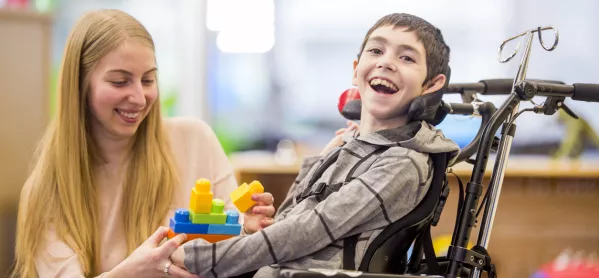- Home
- News
- Specialist Sector
- SEND: Government to pledge 30,000 new school places
SEND: Government to pledge 30,000 new school places

Tens of thousands of new school places for pupils with special needs will be backed by a £2.6 billion funding pot included in this week’s Budget, the Chancellor is set to announce.
The capital investment, which will help create 30,000 “high-quality” school places for children with special needs and disabilities (SEND) over the next three years, will also fund the construction of new free schools, as well as improvements to the accessibility of existing buildings, the Treasury said.
The news comes after Rishi Sunak said on Sunday that the government had “maxed out” on funding for the Covid catch-up effort.
Revealed: The £643m black hole in SEND funding
SEND: Postcode lottery in support revealed
DfE: Financial future of SEND system is fragile
The Treasury told Tes that all of the money for SEND was new, and that it would be able to set out more details on the spending breakdown on Wednesday.
So far, the government has said the investment will be used to fund:
- More than 30,000 new high-quality school places for pupils with SEND to support their learning in both mainstream and special educational needs schools;
- Improvements in the suitability and accessibility of existing buildings, recently recommended in the government’s National Disability Strategy; and
- New special and alternative provision free schools.
Schools and local authorities are seeing a rising demand for specialist support, which comes on top of a shortage of special school places.
This is forcing many local authorities to spend large amounts on independent special school placements, which can be situated a long way from pupils’ homes.
In December, research found that almost 90 per cent of councils in England overspent on their budgets for teaching children with SEND the previous year, with the total funding gap amounting to £643 million.
The findings were reported a month after the Department for Education admitted that the future sustainability of the SEND system in England remained “fragile”.
Geoff Barton, general secretary of the Association of School and College Leaders, told Tes he was pleased to see the government investing in new school places for children with SEND.
However, he said this was “only one part of the picture”.
“There also needs to be a significant increase in sufficient ongoing funding to support these young people,” he said.
“Frankly, the current level of government funding does not match need and this vital provision is under severe pressure. Added to this is the urgent need to reform the labyrinthine complexity of the mechanics of how the funding system currently operates to make it work better for all concerned.
“The government launched a [SEND] review two years ago but this has still not come to any conclusion. This is simply not good enough.”
Mr Sunak said: “I want every child to have the best possible start in life and to fulfil their potential.
“That’s why we’re taking action to fund tens of thousands of new places for students with special needs and disabilities, improving the lives of so many of the nation’s most vulnerable children.”
Meanwhile, the chancellor has indicated that there will be no extra cash for catch-up tutoring or extending the school day included in Wednesday’s Budget.
He told Times Radio on Sunday: “It is pretty clear that the two things that do make the biggest difference to children’s learning is tutoring in small groups, and making sure that our teachers have all the development and training and support they need to be absolutely brilliant.
“We have pretty much maxed out on those things because there is just a constraint on how much of that can be reasonably delivered.”
On extending the school day, he said: “There isn’t as strong an evidence base for [it], compared to things like tutoring and improving the quality and support that we give to teachers.
“That’s what a lot of that £3 billion that we’ve announced is doing. Six million courses of tutoring - that is going to make an enormous difference.”
You need a Tes subscription to read this article
Subscribe now to read this article and get other subscriber-only content:
- Unlimited access to all Tes magazine content
- Exclusive subscriber-only stories
- Award-winning email newsletters
Already a subscriber? Log in
You need a subscription to read this article
Subscribe now to read this article and get other subscriber-only content, including:
- Unlimited access to all Tes magazine content
- Exclusive subscriber-only stories
- Award-winning email newsletters
topics in this article




